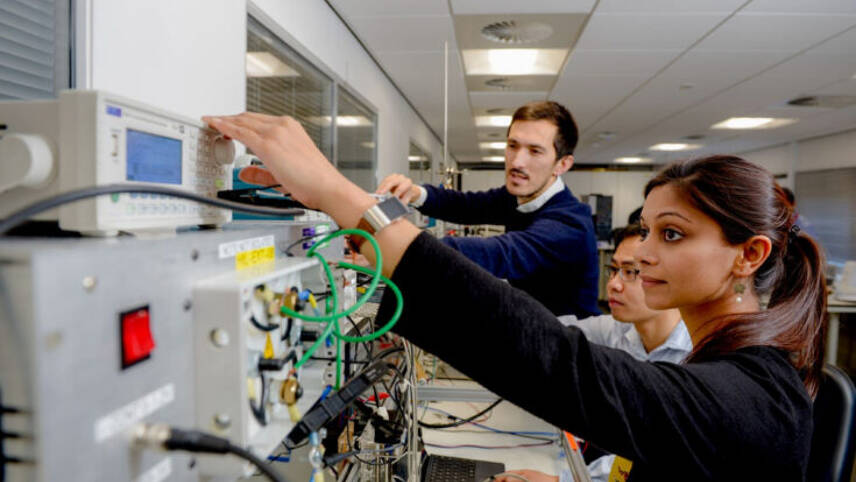Register for free and continue reading
Join our growing army of changemakers and get unlimited access to our premium content

Image: UKRI. Pictured: Researchers working on electric vehicle battery technologies
With more than 20,000 people in attendance, the Government-backed London Tech Week event has been bustling this year. Key themes have included healthcare, computing and low-carbon technologies – as is to be expected in the context of Covid-19, the digital transition and the net-zero transition. Emphasis was also placed on the need to develop technologies which assist with peacekeeping; a virtual address was given to attendees by Ukraine’s President Volodymyr Zelenskyy.
The UK Government itself has marked the event, which closes today (17 June), with funding announcements totalling £743.5m.
The bulk of this funding – £481m – will be funnelled into UK Research and Innovation’s (UKRI) Infrastructure Fund over a three-year period. UKRI has confirmed that it will use £37m of this money to undertake “major upgrades” to its Airborne Atmospheric Measurements laboratory, which tracks pollution and climate change in the UK and internationally.
The Infrastructure Fund will also create a new online and physical hub for the UK’s creative industries and, separately, continue improving its Diamond Light Source lab, UKRI has confirmed at this stage. The Lab hosts a giant microscope which has proven instrumental in the development of vaccines, medications and plastic-eating enzymes. Further plans in the fields of cleantech, medicine, the arts and life sciences are expected to be confirmed in the near future.
UKRI will also receive £118 for its Accelerating Impact Programme, which provides funding to university-led projects in the aim of helping to commercialise innovative products, technologies and services. A further £100m will be added to UKRI’s Future Leader Fellowships scheme, which is similar, but also covers businesses and individuals as well as academia.
Previous Future Leader Fellowship funding willers have developed technologies including self-powered satellites which predict and mitigate natural disasters and permeable pavements that assist with urban flood prevention and urban heat reduction.
Smaller funding pots of £8.5m and of £6m respectively have been allocated for UKRI’s work on the ethics of Artificial Intelligence (AI) and on quantum computing.
Away from UKRI, Innovate UK has been awarded a £30m boost for its Fast Start competition. This scheme provides grant funding to startups in sectors deemed as “key to building the UK’s future economy” – including climate monitoring and low-carbon innovation.
The UK Government has stated that the £743.5m awarded this week will form part of its overarching Innovation Strategy, which targets the leveraging of £22bn of public and private sector finance. That Strategy was first published last July. It includes a target for R&D to contribute to 2.4% of GDP by 2027 and, more recently, the Levelling Up White Paper has emphasised a top-line ambition to boost R&D economies outside of London and the South East. Questions remain about how, exactly, this will be achieved, with organisations representing businesses, civil society and the Government itself warning that Ministers still have a “limited” understanding of how to efficiently improve social and economic equality across the UK.
On climate tech and low-carbon innovation specifically, the Conservatives have pledged £1bn to a net-zero innovation fund, created in March 2021, during this Parliament. The fund supports nascent technologies such as carbon capture and storage (CCS), green and blue hydrogen and small nuclear reactors.
Speaking at London Tech Week, Science Minister George Freeman said: “We are living in a time of huge technological change. New technologies are creating new industries at a pace that would have been thought impossible, even 10 years ago. As a responsible government, we must give our researchers and innovators the tools and the wherewithal to flourish.”


Please login or Register to leave a comment.